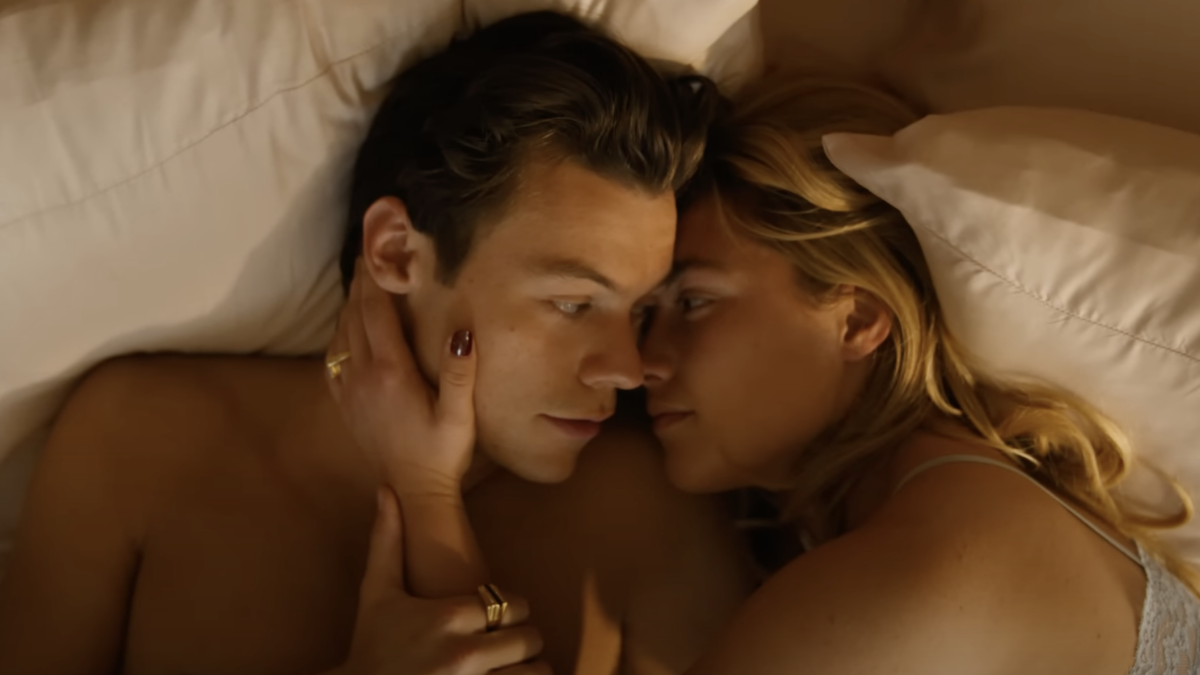Olivia Wilde’s latest feminist flick, “Don’t Worry Darling,” is a mid-century modern-themed fever dream — both for its heroine and audience. In the time-warped town of Victory, California, Alice and Jack, played by Florence Pugh and Harry Styles, drink vodka martinis, have lots of sex, and conform to strict gender roles.
Like all the other couples on their cul-de-sac, Jack brings home the bacon (by working as a “technical engineer” for the mysterious Victory Project, the company responsible for their cookie-cutter marital bliss) and Alice plays housewife (by keeping their idyllic homestead spotless, looking pretty, and making sure dinner’s always ready on time).
But not everything is what it seems, and Wilde makes sure that point is drilled into her audience’s heads again and again — as if, as Adam Nayman at The Ringer notes, “there’s going to be a pop quiz.” Wilde certainly has a penchant for metaphor, and when her heroine starts questioning her seemingly perfect world (thanks to the intervention of another disobedient housewife) she starts feeling suffocated. Cue scene where Alice attempts to asphyxiate herself via Saran wrap. Don’t quite get it yet? Wilde throws in another walls-closing-in realization by literally having the walls close in on Alice in a somewhat dramatic hallucination.
There’s also the recurring circle motif. Whether it’s the Busby Berkeley-esque dance ring that keeps flashing before Alice’s eyes, the pulsing pupil, or the camera’s dizzying panning (more obvious symbolism), Wilde’s over-dependence on circle imagery renders it useless, “becoming an unintended metaphor for a movie that keeps returning to the same point,” Manohla Dargis observes.
And what is that point exactly? That sexism is bad? That women are more than sex objects? That the pristine, happy 1950s housewife crafted by “Mad Men”-type advertising execs is an illusion? Well, no duh. And that’s where “Don’t Worry Darling” falls flat. The plot of the film is so painfully obvious and predictable that it leaves viewers bored. And when the big reveal finally occurs — the Victory Project is a male-power fantasy virtual simulation — viewers are left with more questions than answers (for starters, how did costume designer Arianne Phillips manage to turn the always-dashing Styles into a greasy-haired, hunchbacked simp?).
Even Wilde herself doesn’t get the point of the film, as she keeps changing its official narrative. From feminist thriller to vehicle-for-female-pleasure (which might’ve been true if Styles and Pugh had even the slightest on-screen chemistry) to “Truman Show” spinoff to ominous warning of the far-right politics of the incel community (or as she puts it, the “disenfranchised world of white men on the internet”), Wilde’s disparate explanations of her own film reveal even she doesn’t know what its key takeaway is — and that’s the problem. As a result, “Don’t Worry Darling” is “shallow, arrogant, and unoriginal.”
In fact, Wilde hasn’t thought a lot of things about “Don’t Worry Darling” through. Take, for example, the film’s villain, Frank, Victory’s cult-like leader played by Chris Pine. Wilde revealed that she modeled Frank after clinical psychologist Jordan Peterson, whom she describes as a “pseudo-intellectual hero to the incel community.” Whatever you think of Jordan Peterson, he is neither a “pseudo-intellectual” nor a “hero” to incels (whom he’s referred to as “useless men”). Additionally, Wilde never explains why Jack is moved to brainwash Alice for his own sick sexual pleasure, other than his exposure to the online incel community and losing his job. Is Wilde’s assumption simply that all men have a secret desire to subjugate women, and will act on it if they’re exposed to the right arguments or go through hard times? If so, that is a rather presumptuous (and untrue) assertion to make. Wilde’s only peddling the left’s trite critique of the patriarchy at this point, something Hollywood has done for years (see “The Stepford Wives,” “Rosemary’s Baby”) quite successfully. But Wilde can’t say the same (and she can’t blame it on the film’s bad press).
Here the actress-turned-director missed the opportunity to make “Don’t Worry Darling” somewhat original. By introducing the modern incel community, she could’ve explored its deeper psychological roots. Namely, why is there a growing contingent of young men who feel like society has failed them and turn to misogyny? And why has the sexual revolution’s emphasis on individual autonomy — instead of responsibility — led to fractured relationships between men and women, thereby fueling this trend? Wilde’s film could’ve explored all these questions but instead opted for the generic critique of “patriarchy bad” and called it a day. Because Wilde fails to answer the questions her film raises, she flops.
But there is one redeeming moment of the film — crisp cinematography and impeccable costume design aside. After Alice finds out the truth behind the Victory Project, she has a choice to make. She can either stay in this seemingly perfect world married to Jack, the love of her life, or she can leave, and take all the consequences that come with that. In essence, Alice faces an Oedipus-like dilemma: choose to accept the harrowing reality of the truth (freedom) and its accompanying misery or choose happiness and live a lie (slavery). Alice chooses freedom, as she realizes love cannot exist without it. Whether Wilde intended to make this scene the central point of her film is yet to be verified. But ironically, by including this moment, Wilde articulates the very message of her supposed villain, Jordan Peterson, who constantly admonishes his fans to choose truth and meaning over happiness and temporary pleasure.
All in all, “Don’t Worry Darling” tries to do too much with an unclear target (is it men, the patriarchy, incels, Jordan Peterson??) leaving the audience with more questions than answers. While the premise of the film has potential, it needed a more talented Wilde to bring said potential to fruition. Ironically, viewers come away from the movie feeling as if they’ve just woken up from a bad fever dream — just like Alice.









